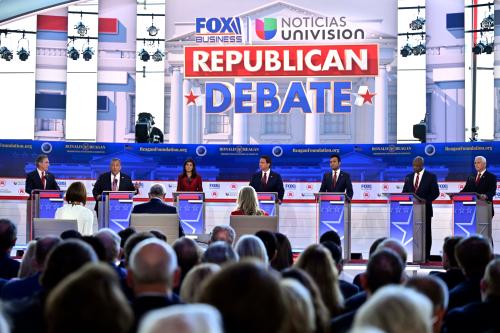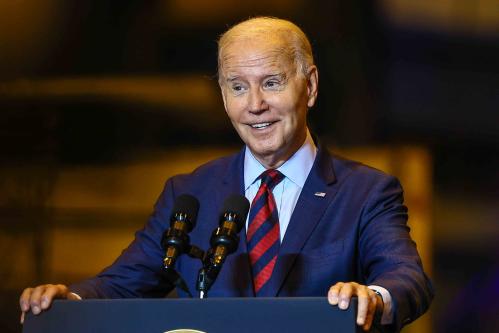On Wednesday, March 14, transportation expert Robert Puentes took your questions on the debate in Congress over the surface transportation bill and its impact on infrastructure challenges facing the nation during a live web chat with Vivyan Tran of POLITICO.
12:30 Vivyan Tran: Welcome everyone, let’s get started!
12:31 Robert Puentes: Good afternoon everyone. This could hardly be a more timely and relevant chat given the Senate is poised to pass their version of the law to reauthorize the nation’s transportation program this afternoon. The bill addresses many of the issues the federal government can and must undertake to help states and metropolitan areas rebalance America’s economy. Transportation and infrastructure is clearly one of those. Yet while the passage of the bill is certainly a positive outcome—many hurdles still remain. Most prominent is reconciling the Senate bill with the House’s intentions, which are still largely TBD.
12:31 Comment From Anne: Why are the Republicans in the House having so much difficulty getting their version of the transportation bill through?
12:35 Robert Puentes: The contrasts between the two proposals could not be more stark. The Senate bill is truly bipartisan, makes key reforms, and sets the stage for a truly transformative six‐year bill in 2013. The House bill turns back the time on the nation’s transportation program at a time when a variety of modes (like transit) are needed, when ports and freight matter in order to connect U.S. metros globally, and when getting the most out of the system matters more than ever.
12:35 Comment From Peter: I recently heard that air travel is going to double in the next 10 years. Will our nation be able to cope with such a huge influx of new travelers?
12:37 Robert Puentes: The good thing is the federal government did pass the aviation law earlier this year—that law addresses major programs and investments in next generation air traffic control to get the most out of existing investments. That’s good. But we’ve got to do a better job connecting our programs. Better alignment between inter-metro area rail and air investments would be a big help.
12:38 Comment From Bethany: With our roads crumbling and millions out of work, why are we even debating the transportation bill? Isn’t infrastructure spending a great way to revive the economy and put America back to work?
12:39 Robert Puentes: As the saying goes, we can give someone a shovel to fill in a pothole but to create long-term value we can also explicitly make those investments part of the shift to a more productive economy. Think exports, think low carbon, think innovation, and job access. By examining our national economy through the lens of transportation we can put people back to work today and also put the economy on a path to long-term productive growth.
12:40 Comment From Jennifer: With the widening of the Panama Canal such a hot button topic in transportation, how does the current proposal address the country’s exports initiative and funding for freight?
12:41 Robert Puentes: A major provision of the Senate bill (MAP-21) is that it consolidates certain programs into a focused freight program to improve the movement of goods. It allows states to obligate money for intermodal connectors such as maritime and rail projects. So back to the question above, for example, the national economic goal of doubling exports will require not only the production of quality goods and services, but the infrastructure to move those goods and services quickly and efficiently by air, rail, sea, and land. The Senate bill addresses this to some extent through the national freight program.
12:42 Comment From George: Is privatization of transportation the way to go? Our freight system for example is private, delivers goods and services across the country in a timely way and is world class.
12:45 Robert Puentes: Partnerships between the private and public sector for all sorts of infrastructure are getting lots of attention now. That’s good. The moment of fiscal stress is forcing new thinking about how we conceive, deliver, and finance a range of investments. Leveraging private sources and expertise, however, will require us to get more sophisticated about the balance between public and private needs. Not all projects, of course, are ripe for such investments but for certain highway, freight, energy, and urban development projects, such partnerships should be on the table.
12:45 Comment From Caitlyn: What do you think is the most important reform in the Senate bill?
12:49 Robert Puentes: There are several meaningful reforms: program consolidation, project streamlining, no earmarks, are all important. We’re interested in reforms to leverage funding and finance such as the America Fast Forward program that helps metros that help themselves, championed by L.A. Mayor Villaraigosa.
12:49 Robert Puentes: Senator Boxer is counting the votes on her hand as we speak (chat)…..
12:49 Comment From Bob: In the current environment, can any other forms of revenue besides the gas tax be considered? Can it even be raised and tied to inflation?
12:52 Robert Puentes: The gas tax is the workhorse of the federal funding bucket. It is hard to replace and even harder to raise—given the current political climate and consternation about gas prices. Things like customs duties should be explored, vehicle miles travelled charges, tolling, public/partnerships, all should be on the table. But there’s no easy fix.
12:53 Robert Puentes: Bill passes 74-22. Yippee.
12:55 Robert Puentes: Interesting to note that outside of Washington the discussion is different. Maryland is looking at raising gas taxes. Chicago has put in place an Infrastructure Trust. Virginia is taking advantage of public/private partnerships. Los Angeles passed a referendum for transportation projects in the middle of the recession. So look outside of Washington for leadership on this issue.
12:55 Comment From Jimmy: Can you put America’s infrastructure in perspective relative to countries like China? Can the U.S provide world-class infrastructure when our labor costs are so high relative to these countries?
12:58 Robert Puentes: We look longingly to nations that put transportation squarely in the service of their economy. Canada has a merit-based freight strategy that guides investments. The UK invested in congestion pricing and transit expansion to expand access to pools of labor. Australia has a national transportation strategy. Japan works with private firms to integrate technology and get the most out of the system. We can wring our hands over the investments we don’t have, but putting it in the right economic frame is probably the most important lesson we can learn.
12:59 Comment From Scott: Aside from a longer authorization and a gas tax increase, what reforms *not* included in the Senate and House bills would you most like to see Congress take up this year or next?
1:01 Robert Puentes: A stronger focus on performance measures, innovate finance vehicles like an infrastructure bank, clearer articulation of national objectives and the 21st century federalist approach to get there.
1:01 Robert Puentes: Sorry I couldn’t get to all the great questions. Thanks for joining us today!
1:01 Vivyan Tran: Thanks for the questions everyone. See you again next Wednesday!



Commentary
Web Chat: Investing in Transportation Infrastructure
March 14, 2012